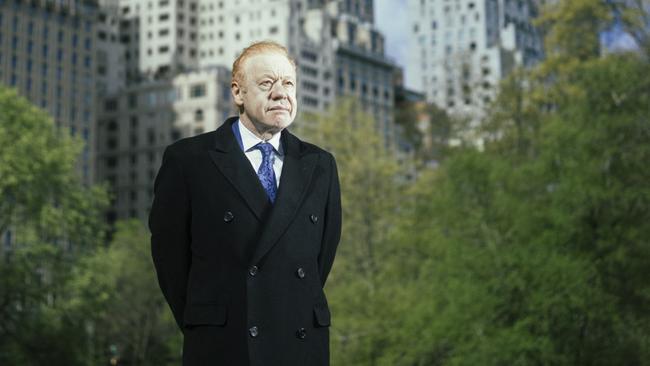Asia’s food sales shifting online, says Anthony Pratt
There are five ‘megatrends’ that will reshape Australia’s agriculatural sector, packaging billionaire Anthony Pratt says.

Online sales of Australian horticultural products into Asia is the next big opportunity for the nation’s food exports as markets realign after the Covid pandemic, according to paper, packaging and recycling magnate Anthony Pratt.
In his address to The Australian’s ninth annual food forum in Sydney on Tuesday, the billionaire will laud a 60 per cent increase in Australian food exports and the opening of more than 2000 food and beverage manufacturing plants across the country since 2013.
The federal government has made food and beverage manufacturing one of its six focus sectors for Australia’s post-Covid manufacturing renaissance.
Underpinning that vision has been the introduction of accelerated depreciation provisions for capital investments, which Mr Pratt said had already spawned additional investment and jobs coming into the food manufacturing sector.
“Food production is Australia’s biggest manufacturing sector, with a third of all manufacturing jobs and over 14,000 food businesses. With our total food exports going up by 60 per cent since our first Global Food Forum in 2013, I’m confident more and more countries will be looking for safe Australian food as global markets realign,” Mr Pratt will say.
The executive chairman of the multinational Visy Group, whose US arm Pratt Industries is the fifth-largest packaging group in America, will outline five intertwined megatrends he claims are transforming the local agribusiness sector.
“Digitisation helps value-adding, e-commerce leverages trade opportunities and sustainability builds customer trust,” Mr Pratt will say.
One of the biggest opportunities for food exports is online sales of local added-value horticulture like cherries to Asia or other counter-seasonal northern hemisphere countries.
“Exporting our summer fruit to their winter – whether it be Japan or the UK – is a no-brainer, and I highly recommend we make this a constant focus.
“And online could come right into the orchard. I predict the emergence of a channel whereby an Aussie farmer gets an order on her iPhone, picks it off the vine, and sends it to someone’s home – direct to consumer … straight off the vine for next-day delivery,” Mr Pratt will say.
Using the example of Tasmanian cherries, he will claim that compared with the usual “frozen and then defrosted” fruit, the ability to deliver next-day fresh fruit into Asian markets could bring a huge competitive advantage for Australia in the post-Covid world.
“Some say this is a pipe dream, but that’s what they said about online food retail. In fact, already some Australian summer fruit exports to Asia command a 41 per cent price premium compared with all other markets.
“Cherries can fetch $40 a kilo, and there are plenty of Asian customers who will pay this,” he will say.
Blockchain tech
Last year global cards giant MasterCard and Chinese internet behemoth Alibaba joined with Blockchain Australia to establish a new platform for authenticating and tracking the nation’s food, wine and produce exports into Asia using blockchain technology.
Provided by an industry group known as the APAC Provenance Council (APC), the platform is using blockchain to digitally track exports and offering supply chain finance through MasterCard and Alipay — Alibaba’s payment system — to help farmers get paid earlier for their produce.
One of the panellists at Tuesday’s Global Food Forum, fledgling listed spirits producer Top Shelf International, is also working with a software-as-a-service marketing group called Lava to help tequila drinkers track the Australian agave plant from which their spirit was made.
Top Shelf is working with Lava to use bar code verification technology to effectively identify and track each agave plant at the nation’s biggest agave farm between Airlie Beach and Bowen in North Queensland.
Adem Karafilli, the chairman of Top Shelf – which has big name backers including the Harvey family office run by Gerry Harvey’s son Michael, rich-lister Bruce Neill’s ASX-listed Australian Whisky Holdings, Sydney investment firm Alium Capital Management and Aurizon chairman Tim Poole – has a vision to effectively sell an agave plant to a customer now for them to take the distilled spirit product from the plant in a bottle in the future.
In his address to the Global Food Forum, Mr Pratt will argue many food buyers – especially Millennials and Gen-Zs who have a big focus on the environment – now want to know their products are produced responsibly.
He will claim that 57 per cent of millennials actively search out products and companies that use only plant-based packaging.
The rise of plant-based products has seen 33 major traditional meat companies take a financial stake in a plant-based protein start-up in recent years.
The Bill Gates-backed plant-based meat producer Beyond Meat is backed by one of America’s biggest beef producers, Tyson Foods and global food producer Cargill, which has also invested in a US firm Memphis Meats, which produces meat from the stem cells of animals.





To join the conversation, please log in. Don't have an account? Register
Join the conversation, you are commenting as Logout